Northern Ireland MLAs want clarity on child cardiac surgery cases
- Published
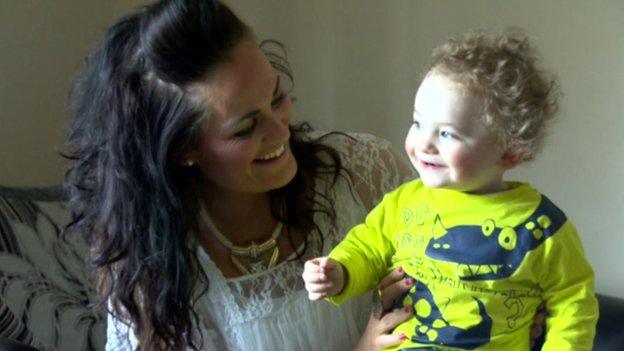
Lorraine McEldowney's son Brogan had an emergency atrial septostomy performed on him
Members of NI's health committee are calling for greater clarity on details of cases of children travelling to Dublin for life-saving heart surgery.
A number of MLAs have said that despite the health board assuring the committee early last year that there were no emergencies, some parents and surgeons are suggesting otherwise.
The future of children's heart services is expected to be announced in July.
That will follow a review by an international independent panel.
According to the Ulster Unionist Party's Roy Beggs, there is evidence that heart surgery for children should be retained in Belfast.
He said he was aware of three cases between December 2012 and April 2013 where very sick babies required emergency surgical intervention before being transferred to Dublin.
'Splitting hairs'
However, early last year, at a health committee briefing, the health board informed members that while there may have been urgent cases, these were not classified as emergencies.
According to Mr Beggs, the board is splitting hairs.
"The difference between urgent and emergency can be a very thin line," he said.
"And the point is that, in a few cases, there needed to be a surgical intervention carried out in Belfast before the child could be transferred to Dublin.
"Whether or not the surgery was required in 24 or 48 hours, surgery was still required and therefore should be retained in Belfast."
Northern Ireland's Health and Social Care Board (HSCB) have refuted allegations that either it or the Public Health Agency (PHA) were not being transparent.
In a statement to the BBC, a spokesperson said: "The board and the PHA can confirm that from 1 December 2012 to 30 April 2013, there were no emergency paediatric cardiac surgical cases undertaken in Belfast.
"This is consistent with the evidence given by the HSCB and PHA to the health committee on 1 May 2013. "
However, Mr Beggs said during that committee briefing on 1 May, Dr Miriam McCarthy of the PHA was not forthcoming with important detail.
"It would have been much healthier if the full picture was given into specific cases where very sick infants did require surgery - whether or not these were described as urgent or emergency means very little to the public," he said.
The health board, however, said emergency cases are defined as those requiring surgical intervention within 24 hours.
The three cases between 1 December 2012 and April 2013 were classified by the Belfast Health Trust as urgent, requiring intervention within 72 hours.
The HSCB and the PHA have established with the Belfast Trust a robust monitoring system by which service activity and the timeliness of access to surgery is reviewed on an ongoing basis.
During the period 1 May 2013 and March 2014 there was one emergency procedure undertaken in Belfast Trust.
This was a child who had elective surgery in Belfast and had complications that required a second emergency surgery procedure two days later.
The BBC has been in contact with a family of an infant who received cardiac treatment in Belfast.
Surgery 'saved baby's life'
Lorraine McEldowney's new-born baby son Brogan was diagnosed with a heart defect shortly after he was born at the Causeway Hospital in Coleraine in January 2013.
According to Mrs McEldowney, she was told that emergency surgery performed in Belfast saved her baby's life.
"My son was seriously ill. In fact, he was so ill that a team of doctors was sent from Belfast to stabilise him in the Causeway. They then travelled with him by ambulance to Belfast for emergency surgery," she said.
"Because I'd had a caesarean section I couldn't travel with my baby. It was awful."
A surgeon at the Royal Victoria Hospital in Belfast performed an emergency atrial septostomy.
This is a surgical procedure in which a small hole is created between the upper two chambers of the heart.
It is normally used to treat life-threatening congenital heart defects seen in babies.
According to Mrs McEldowney, she was told that her baby would not have survived travelling to Dublin without the emergency surgery in Belfast.
"I was told that Brogan's oxygen levels were so low that he may have died or been seriously brain damaged," she said.
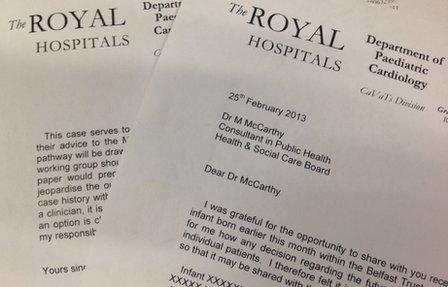
A letter leaked to the BBC outlined the details surrounding one case
In a statement, the Belfast Health Trust said: "The possibility of any procedure on a sick new-born infant must be an emergency to that baby's family.
"This baby did not have a surgical operation, he had an emergency cardiology procedure to stabilise his condition. The baby was then transferred to Dublin for surgery."
Leaked letter
In a further development, the BBC can also reveal that the Department of Paediatric cardiology in Belfast wrote to the health board last year stressing the importance of retaining surgery in Belfast.
The letter was sent in February 2013.
In the letter, leaked to the BBC, consultant paediatric cardiologist Dr Brian Craig wrote to Dr Miriam McCarthy, outlining the details surrounding one case which he said "crystallised" how any decision regarding the future of paediatric congenital cardiac services (PCCS) in Belfast could impact on individual patients.
Dr Craig described what happened following the birth of baby in a maternity unit in Northern Ireland.
He said: "It was clear that the only intervention at this stage, which could improve the child's condition, was an emergency balloon atrial septostomy. The infant's condition was stabilised."
The letter continues that if an option was chosen by the health minister where there is no paediatric cardiac surgical presence in Belfast, it will not be possible to carry out any balloon septostomy in the Belfast trust without appropriate surgical cover.
"An infant will have to be transferred to a surgical centre in an unstable condition with deteriorating oxygen levels and increasing metabolic acidosis," Dr Craig said.
He went on to say that even if an infant should survive the transfer, the cardiologist would be faced with a deteriorating situation and a hazardous intervention.
According to figures provided by the Health and Social Care board between 1 May 2013 and March this year, there have been two emergency cases, five urgent cases and two elective cases were referred from NI to Dublin for paediatric cardiac surgery.
- Published24 February 2014
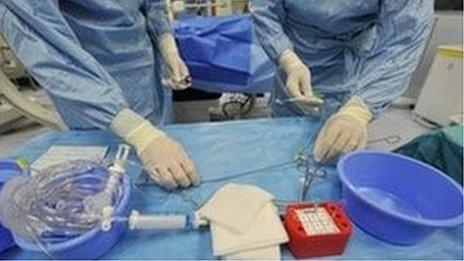
- Published9 December 2013

- Published3 December 2013
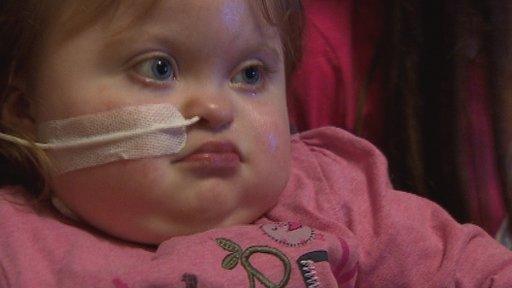
- Published18 November 2013

- Published12 June 2013
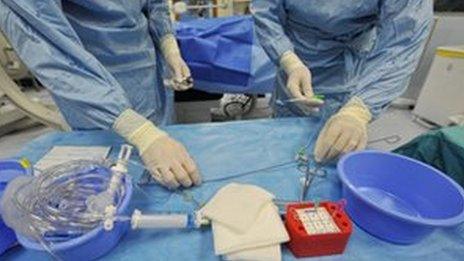
- Published25 April 2013
